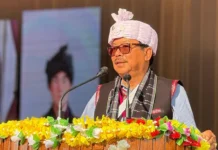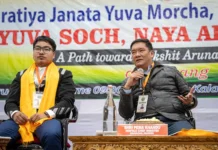[ Ripi Bagra ]
Private universities and colleges in Arunachal Pradesh serve as pillars of education and opportunity; yet, beneath their façade lies a troubling reality for many employees. From inadequate salaries to the absence of leave facilities and discriminatory pay practices, these institutions perpetuate systemic injustices that undermine the principles of fairness and equity.
One of the most pervasive issues plaguing employees in private universities is the glaring disparity in salaries. Despite their qualifications and contributions, many employees receive remuneration well below industry standards, with little to no transparency in the salary structure. This lack of transparency not only fosters resentment but also hampers employees’ ability to negotiate fair compensation based on their qualifications and experience.
Furthermore, the absence of a standardised salary scale often results in arbitrary wage determinations, wherein faculty members with similar qualifications and work experience may draw vastly different salaries. This inequity is amplified by the administration’s tendency to prioritise ‘non-locals’ over ‘local’ candidates, perpetuating a cycle of discrimination and marginalisation within the institution.
A prevalent issue in private universities in Arunachal is the discriminatory pay practices based on regional origins. A faculty of a private university opined that it is not uncommon for institutions to offer higher salaries to faculty members recruited from outside the state while relegating local employees to lower pay scales, regardless of their qualifications or experience. This discriminatory practice not only perpetuates regional biases but also undermines the principles of fairness and meritocracy within the institution.
Moreover, the imposition of an arbitrary salary cap for local candidates further exacerbates the wage disparity, relegating deserving individuals to meagre compensation that fails to reflect their qualifications and contributions.
The pervasive inequities and discriminatory practices in private universities have far-reaching implications for employee morale and the overall work environment. Local employees, often relegated to lower pay scales and marginalised within the institution, may feel undervalued and demotivated, leading to diminished productivity and job satisfaction.
The employment practices of private universities in Arunachal, which prioritise cost-cutting measures by hiring local faculty at minimal expense, often result in detrimental consequences for both the quality of education and the wellbeing of employees. By prioritising financial considerations over the recruitment of dedicated and qualified faculty members, these institutions inadvertently compromise the standard of education they offer.
Underpaid faculty members may find themselves compelled to take on additional side jobs or projects to make ends meet, diverting their time and energy away from their primary responsibilities within the university. This diversion of focus not only detracts from their effectiveness in the classroom but also diminishes their capacity for research, mentorship, and other academic pursuits essential for a robust educational environment.
The prevalence of underpaid and overworked faculty members increases the likelihood of hiring individuals who may not possess the requisite qualifications or dedication to uphold academic standards. This compromises the quality of instruction and academic support provided to students, ultimately eroding the credibility and reputation of the institution.
In a state like Arunachal, where the literacy rate is already low, such practices worsen existing educational challenges, rather than alleviating them. Instead of serving as beacons of knowledge and innovation, private universities and colleges risk becoming breeding grounds for mediocrity and academic stagnation, further widening the educational divide within the state.
The challenges faced by employees in private universities and colleges in Arunachal, including low salary structures, absence of leave facilities, and discriminatory practices in salary distribution underscore the pressing need for reform in employment practices. It is imperative for university administrations to prioritise fair and equitable compensation, establish comprehensive leave policies, and eradicate discriminatory practices to foster a work environment conducive to employee wellbeing, satisfaction, and professional growth.
In conclusion, the disparity in pay between local and non-local faculty members, despite similar qualifications and work experience, raises pertinent questions about fairness and equity in employment practices within private universities in Arunachal. Is it justifiable to recruit a majority of faculty from outside the state, especially considering the unemployment issues prevalent within the state? Does the apparent reluctance of local candidates to conform to administrative directives make them less attractive to employers? Alternatively, could this wage discrepancy be attributed to a perceived superiority complex among employers, who might unjustly consider local candidates subpar? These questions delve into the complex dynamics of regional biases, employment trends, and institutional attitudes that warrant careful examination and reform. (The contributor is an independent researcher)




